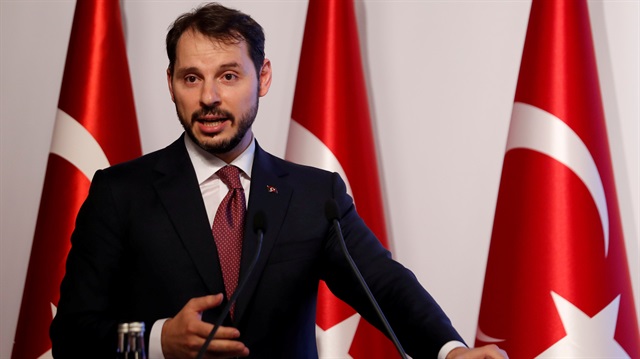
Turkey has no plans to go to the IMF for support over its currency crisis, Finance Minister Albayrak says
Treasury and Finance Minister Berat Albayrak said on Thursday that Turkey fully understood and recognised all its domestic challenges and will come out of the current market volatility stronger.
In a conference call with investors, Albayrak said Turkey was now dealing with the market anomaly and has a banking sector which is healthy and strong.
The finance minister added that Turkey has no plans to go to the International Monetary Fund (IMF) for support over its currency crisis.
Before he spoke, the Turkish lira strengthened more than 3 percent. The currency shrugged off U.S. comments ruling out the removal of steel tariffs on Turkey even if it frees an American pastor who lies at the centre of the complex feud between Washington and Ankara.
The currency gained some support from the announcement late on Wednesday of a Qatari pledge to invest $15 billion in Turkey.
Albayrak stated that Turkey would meet its fiscal target through tighter spending. It would also focus on attracting foreign direct investment, he said.
A lot of countries across the globe are facing the problem of U.S. sanctions and the response to that should be a coordinated one, Albayrak said.
Speaking to around 6,000 investors in his first such call since being appointed to the cabinet in July, Albayrak, said Turkey will navigate this period of U.S. sanctions with other parties such as Germany, Russia and China.
The minister announced that the government will see certain expenditure cuts and the revenue side was showing positive performance.
Albayrak said he expected a 6 billion lira ($1.04 billion) primary surplus for the end of this year. ($1 = 5.7711 liras)
He also said that Turkey won't hesitate to provide support to the banking sector, which was capable of managing current volatility, and there has not been major deposit flow from banks lately.
He added that Turkey had already taken measures to curb forex funding and corporates are in a comfortable position to meet short-term liabilities.
JP Morgan said that moves by Turkish authorities to curb the lira's fall showed they were committed to stabilising the currency with technical measures such as restricting foreign exchange swaps and cancelling repo auctions to push up the average cost of bank funding.
Turkey will not compromise on fiscal discipline and reducing inflation is a top priority, Albayrak said.
Albayrak expressed that Turkey was not a highly leveraged country and debt stood at 137 pct of GDP in the first quarter of 2018. All ministries have a mandate for ambitious savings, he added, and investment portfolios will be reviewed.
Turkey has never implemented non-market measures and capital controls will never be on the agenda, the finance minister added.
Structural reforms and labour market flexibility are also a priority, he said.








